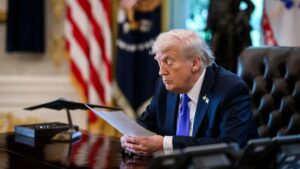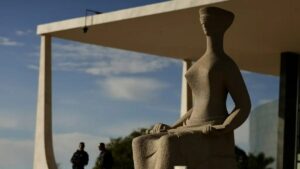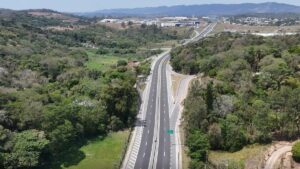On Sunday morning, a puffy, Michelin Man-like figure trudged through Times Square in New York, panting from the exertion of trying to move while wearing 27 hazmat suits.
Inside the white cocoon was Zhisheng Wu, a Chinese artist who staged the street performance to criticize China’s unrelenting zero-Covid policy.
“Protective suits have become a visual symbol in the collective experience and collective memory of every Chinese person,” said Wu, a 28-year-old graduate student at the School of the Art Institute of Chicago.
With the suits’ hoods wrapped tightly around his head, exposing only his nose and part of his eyes, Wu said he had been transformed into a “monster” with dulled senses. Originally he had planned to wear 100 of them but discovered 27 was the most he could fit into. As he staggered on, the artist stooped lower and lower until he had to resort to crawling. Eventually, he collapsed onto the ground and was helped by his assistant to break free from the suits, his face flushed and drenched in sweat.

The artist donned 27 hazmat suits for his performance. Credit: Yong Xiong/CNN
“I want to use it as a metaphor for each Chinese individual being drowned in the political torrent,” he said.
In China, however, Covid workers dressed head-to-toe in hazmat suits are still omnipresent almost three years after the virus emerged. Dubbed “dabai,” or “big whites,” they toil at Covid testing sites and quarantine camps, guard airports and train stations, and spray clouds of disinfectant in the streets and residential communities.
For many in China, they’ve come to embody the government’s zero-tolerance approach, which relies on mass testing, extensive quarantines and snap lockdowns to stamp out infections at all costs — even as much of the world has moved on from the pandemic.
For Wu, the dabai are also an embodiment of power and subjugation. “You feel like you can never get out of their control. There’s an invisible sense of oppression,” he said.

The artist said by wearing the suits he had been transformed into a “monster” with dulled senses. Credit: Yong Xiong/CNN
The dabai are the foot soldiers of the government’s zero-Covid campaign. They include residents who volunteer to help their neighbors during lockdowns, as well as bureaucrats and public health workers carrying out measures that — to outside observers, especially — can border on the absurd.
“They might be ordinary people or your neighbors. But once they put on the dabai suit, they become an estranged manager, an emotionless machine,” Wu said.
The cost of zero-Covid
He was locked down in Beijing for two weeks, filled with anxiety and fear for the future. But the Covid situation in China soon improved. By April, the outbreaks had been largely contained, and life returned to some kind of normalcy.

Wu was helped by his assistant to break free from the suits. Credit: Yong Xiong/CNN
It didn’t take long for Wu, who was vaccinated, to overcome his fear: he ended up catching Covid and was fortunate enough to quickly recover from his cold-like symptoms. Meanwhile, the restrictions in China became increasingly stringent following the arrival of the highly infectious Omicron variant.
Wu’s father, a professor in an eastern province, was punished by his university for fleeing an imminent lockdown and driving back to his Beijing home without his employer’s approval. His mother was prevented from visiting his ill grandmother due to travel restrictions. Many of Wu’s friends in the art industry lost their jobs, as galleries and exhibitions closed amid ongoing lockdowns.
“All these costs are born by every Chinese person, as tiny and inconsequential as specks of dust,” he said.
Compelled to act

Many of Wu’s friends who work in the art sector have lost their jobs. “The art industry (galleries and exhibitions) has been cut down first during the pandemic because it’s considered irrelevant and useless to the country’s economy. Credit: Yong Xiong/CNN
Such a performance would be unthinkable in China, where artists have faced increasingly stringent censorship since leader Xi Jinping came to power in 2012. But staging it in New York could also carry risks for Wu and his family.
The artist said he was worried about his parents’ safety back in China, fearing they could be subjected to potential retaliation from the government. But he said he nonetheless felt compelled to proceed with the project and to express years’ worth of suppressed emotions toward zero-Covid.
Some analysts took this as a sign that China is unlikely to relax its pandemic restrictions anytime soon. To Wu, China’s insistence on zero-Covid is directly tied to its political environment.
“I feel like (the government’s) power is ever-growing, becoming bigger and bigger like a giant,” he said. “And as individuals, our feelings and emotions will be increasingly submerged as we become tinier and tinier.”



